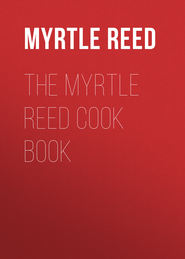По всем вопросам обращайтесь на: info@litportal.ru
(©) 2003-2024.
✖
The Master's Violin
Автор
Год написания книги
2017
Настройки чтения
Размер шрифта
Высота строк
Поля
“Meanwhile the Doctor had led the horse a little way ahead, and had come back. The whole tribe was behind us, yelling like wild Indians, and we were in the midst of a rain of stones. Doctor Brinkerhoff got in and started the horse at full speed.
“‘We’ll put her down,’ he said, ‘a little farther on. She can walk back.’
“She was quiet, and her head was down, but I had one look from her eyes that haunts me yet. She hated everybody – you could see that, – and yet there was a sort of dumb helplessness about it that made my heart ache.
“She got out, obediently, when we told her to, and stood by the roadside, watching us. ‘Doctor,’ I said, ‘that child is not like the others, and she has been badly used. I want her – I want to take her home with me.’
“‘Bless your kind heart, dear lady,’ he replied, laughing, and we were almost at home before I convinced him that I was in earnest. He would not let me go there again, but the very next day, he went, late in the afternoon, and brought her to me after dark, so that no one might see. East Lancaster has always made the most of every morsel of gossip.
“The poor little soul was hungry, frightened, and oh, so dirty! I gave her a bath, cut off her hair, which was matted close to her head, fed her, and put her into a clean bed. The bruises on her body would have brought tears from a stone. I sat by her until she was asleep, and then went down to interview the Doctor, who was reading in the library.
“He said that the people who had her were more than glad to get rid of her, and hoped that they might never see her again. Nothing had been paid toward her support for a long time, and they considered themselves victimised.
“Of course I put detectives at work upon the case and soon found out all there was to know. She was the daughter of a play-actress, whose stage name was Iris Temple. Her husband deserted her a few months after their marriage, and when the child was born, she was absolutely destitute. Finally, she found work, but she could not take the child with her, and so Iris does not remember her mother at all. For six years she paid these people a small sum for the care of the child, then remittances ceased, and abuse began. We learned that she had died in a hospital, but there was no trace of the father.
“There was no one to dispute my title, so I at once made it legal. Shortly afterward, she had a long, terrible fever, and oh, Margaret, the things that poor child said in her delirium! Doctor Brinkerhoff was here night and day, and his skill saved her, but when she came out of it she was a pitiful little ghost. Mercifully, she had forgotten a great deal, but even now some of the horror comes back to her occasionally. She knows everything, except that her mother was a play-actress. I would not want her to know that.
“For a while,” Aunt Peace went on, “we both had a very hard time. She was actually depraved. But I believed in the good that was hidden in her somewhere – there is good in all of us if we can only find it, – and little by little she learned to love me. Through it all, I had Doctor Brinkerhoff’s sympathetic assistance. He came every week, advised me, counselled with me, helped me, and even faced the gossips. All that East Lancaster knows is the simple fact that I found a child who attracted me, discovered that her parents were dead, and adopted her. There was a great deal of excitement at first, but it died down. Most things die down, my dear, if we give them time.”
“Dear Aunt Peace,” said Margaret, softly, “you found a bit of human driftwood, and with your love and your patience made it into a beautiful woman.”
The old face softened, and the serene eyes grew dim. “Whenever I think that my life has been in vain; when it seems empty, purposeless, and bare, I look at my little girl, remember what she was, and find content. I think that a great deal will be forgiven me, because I have done well with her.”
“I am so glad you told me,” continued Margaret, after a little.
“Her future has sorely troubled me. Of course I can make her comfortable, but money is not everything. I dread to have her go away from East Lancaster, and yet – ”
“She never need go,” interrupted Margaret. “If, as you say, the house comes to me, there is no reason why she should. I would be so glad to have her with me!”
“Thank you, my dear! It was what I wanted, but I did not like to ask. Now my mind will be at rest.”
“It is little enough to do for you, leaving her out of the question. She might be a great deal less lovely than she is, and yet it would be a pleasure to do it for you.”
“She will repay you, I am sure,” said Aunt Peace. “Of course Lynn will marry sometime,” – here the mother’s heart stopped beating for an instant and went on unevenly, – “so you will be left alone. You cannot expect to keep him in a place like East Lancaster. He is – how old?”
“Twenty-three.”
“Then, in a few years more, he will leave you.” Aunt Peace was merely meditating aloud as she looked out of the window, and had no idea that she was hurting her listener. “Perhaps, after all, Iris will be my best bequest to you.”
“Iris may marry,” suggested Mrs. Irving, trying to smile.
“Iris,” repeated Aunt Peace, “no indeed! I have made her an old-fashioned spinster like myself. She has never thought of such things, and never will!”
(At the moment, Miss Temple was reading an anonymous letter, much worn, but, though walls have ears, they are happily blind, and Aunt Peace did not realise that she was nowhere near the mark.)
“Marriage is a negative relation,” continued Miss Field, with an air of knowledge. “People undertake it from an unpardonable individual curiosity. They see it all around them, and yet they rush in, blindly trusting that their own venture will turn out differently from every other. Someone once said that it was like a crowded church – those outside were endeavouring to get in, and those inside were making violent efforts to get out. Personally, I have had the better part of it. I have my home, my independence, and I have brought up a child. Moreover, I have not been annoyed with a husband.”
“Suppose one falls in love,” said Margaret, timidly.
“Love!” exclaimed Aunt Peace. “Stuff and nonsense!” She rose majestically, and went out with her head high and the step of a grenadier.
Left to herself, Margaret mentally reviewed their conversation, passing resolutely over the hurt that Aunt Peace had unconsciously made in her heart. Never before had it occurred to her that Lynn might marry. “He can’t,” she whispered; “why, he’s nothing but a child.”
She turned her thoughts to Iris and Aunt Peace. The homeless little savage had grown into a charming woman, under the patient care of the only mother she had ever known. If Aunt Peace should die – and if Lynn should marry, – she did not phrase the thought, but she was very conscious of its existence, – she and Iris might make a little home for themselves in the old house. Two men, even the best of friends, can never make a home, but two women, on speaking terms, may do so.
“If Lynn should marry!” Insistently, the torment of it returned. If he should fall in love, who was she to put a barrier in his path? His mother, whose heart had been hungry all these years, should she keep him back by so much as a word? Then, all at once, she knew that it was her own warped life which demanded it by way of compensation.
“No,” she breathed, with her lips white, “I will never stand in his way. Because I have suffered, he shall not.” Then she laughed hysterically. “How ridiculous I am!” she said to herself. “Why, he is nothing but a child!”
The mood passed, and the woman’s soul began to dwell upon its precious memories. Mnemosyne, that guardian angel, forever separates the wheat from the chaff, the joy from the pain. At the touch of her hallowed fingers, the heartache takes on a certain calmness, which is none the less beautiful because it is wholly made of tears.
Lynn’s violin was silent now, and softly, from the back of the house, the girl’s full contralto swelled into a song.
“The hours I spent with thee, Dear Heart,
Are as a string of pearls to me;
I count them over, every one apart —
My rosary! My rosary!”
Iris sang because she was happy, but, none the less, the deep, vibrant voice had an undertone of sadness – a world-old sorrow which, by right of inheritance, was hers.
Margaret’s thoughts went back to her own girlhood, when she was no older than the unseen singer. Love’s cup had been at her lips, then, and had been dashed away by a relentless hand.
“O memories that bless and burn!
O barren pain and bitter loss!
I kiss each bead and strive at last to learn
To kiss the cross – Sweetheart! To kiss the cross!”
“‘To kiss the cross,’” muttered Margaret, then the tears came in a blinding flood. “Mother! Mother!” she sobbed. “How could you!”
Insensibly, something was changed, and, for the first time, the woman who had gone to her grave unforgiven, seemed not entirely beyond the reach of pardon.
IX
Rosemary and Mignonette
“Sweet Lady of my Dreams, it cannot be that you are displeased. If you were, I should know, but do not ask me how!
“Day by day, my eyes long for the sight of you; night by night my heart remembers you, for that inner vision does not vanish with the sun. You have unconsciously given me a priceless gift, for wherever I may go, I take you with me – all the grace of you, all the beauty, and all the softness. I have only to close my eyes and then I see.
“But do not think I keep your image always before me, for it is not so. In the work-a-day world, you have no place. You belong, rather, to those fair lands of fancy which lie just beyond the borders of this world and are, or so I think, very near the gleaming gates of Heaven.
“I am not always at work, but sometimes, even when I am, you come tripping before my eyes, so dainty, so wholly exquisite, that I forget what I am doing, and then I must put you aside. But when the day is done, and the light of it shows only through the pinholes pricked in the curtain of night, then I can think of you, as radiant, as beautiful, and as far above me as those very stars.
“All unknowingly, you are the light of my day. Whatever darkness might surround me, your eyes would make it noon. However steep and thorny my path, your hand in mine would make it a sunny meadow, swept by shadowy wings, where the white and crimson clover bloomed all day.
“You give me life. You make the birds sing more sweetly for me; you make the roses more fragrant, the moonlight more like pearl. You have glorified the commonplace affairs of the day with your enchantment; you have put the joy of the gods into the heart of a man.
“Do you wonder that, loving you like this, I do not make myself known? Sweetheart, it is because I fear. Already I have more than I deserve because you are not displeased with me, and since I wrote last I have made progress. Would it surprise you very much if I told you I knew where you lived?











